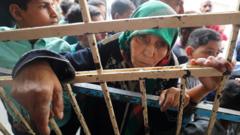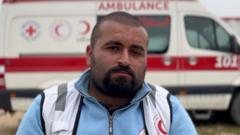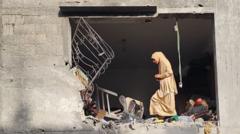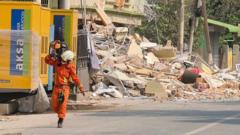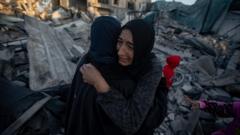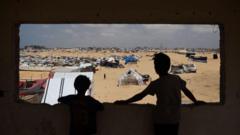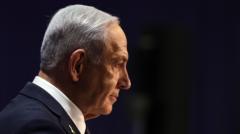Gadi Moses, recently freed after 15 months of captivity, endured extreme deprivation and loneliness while held by Hamas in Gaza. His niece reflects on the emotional toll of his release, while families of other hostages express relief but concern for their loved ones' well-being. As negotiations continue, the humanitarian situation remains precarious.
Survivor's Struggle: The Harrowing Tale of Israeli Hostage Gadi Moses
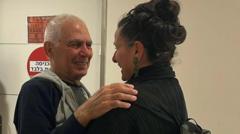
Survivor's Struggle: The Harrowing Tale of Israeli Hostage Gadi Moses
Gadi Moses, an 80-year-old Israeli hostage, reveals the intense hardships he faced during 15 months in Hamas captivity, as families of released hostages share their emotional reunions and ongoing concerns.
While held for 15 grueling months by Hamas in Gaza, 80-year-old Gadi Moses managed to survive on only the barest of sustenance: a piece of bread and an olive daily. His niece, Efrat Machikawa, recounted his unimaginable ordeal, expressing her astonishment that he endured such conditions. “I have no idea how he survived,” she stated. Gadi's only comforts were a small bowl of water every five days and the rare opportunity to use the toilet, emphasizing the grim reality he faced in solitude.
To cope with the overwhelming loneliness that felt like a layer of torture, he engaged in mental exercises, solving math problems in his head, and walking within the confines of his space up to 11 kilometers daily. “Even in the darkest times, he found ways to uplift himself,” Efrat shared. The thought of reuniting with family and worrying about their well-being gave him strength—his sole source of nourishment for the spirit.
Gadi was among 18 hostages released this year as part of ceasefire negotiations between Israel and Hamas, a tense exchange encompassing the release of 583 Palestinian prisoners. This ceasefire follows a period of devastation, where Hamas's assault on Israel resulted in the loss of approximately 1,200 lives, while retaliatory Israeli military actions reportedly claimed over 47,000 lives in Gaza according to health reports from the area.
Public accounts of former hostages have shed light on the dire living conditions they experienced. Keith Siegel, another hostage released recently, returned home visibly diminished, with his niece Tal Wax expressing both relief and concern as he appeared thinner yet resilient. “He had to endure a lot of horrible situations in captivity while still remaining the good person he is,” she said.
Efrat Machikawa recounted the harrowing experience of Gadi's release, recalling how he feared for his life as crowds enveloped him the moment he was freed. Finally reunited, she expressed that she could breathe easier now, relieved by the powerful embrace that reassured her of her uncle's survival. Gadi spoke of his aspirations for rehabilitation and returning to his life as an agricultural expert.
Highlighting her mixed emotions, Efrat expressed gratitude towards the mediators involved in the negotiations, such as Qatar and the US, and emphasized the need to ensure every hostage's safe return. “We must eradicate terror,” she stated, stressing the importance of Israel working towards better regional relations.
Other freed hostages have begun to share their experiences publicly. Doron Steinbrecher, freed two weeks prior, released a video statement acknowledging her long journey from captivity to freedom. She reassured families of those still held captive that they were not forgotten, pledging to continue the fight for their release.
As families, like the Bibas, welcomed back some loved ones while mourning others still missing, the emotional landscape remains complex. “A quarter of our heart has returned,” they remarked. This evolving saga leaves many in anticipation as negotiations for the release of remaining hostages continue amid the ongoing turmoil in the region.




